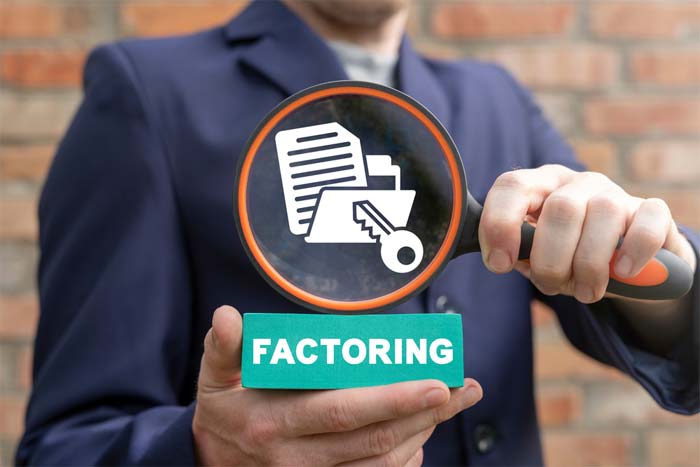Many small businesses suffer from cash flow problems when customers are late in paying their invoices. The best factoring companies, also called factors, help out other businesses by offering to purchase their invoices as collateral for immediate cash, highlighting why factoring is a good alternative financing option. They do this by giving them the money they need now, so small companies can pay employees, suppliers, and other expenses.
By using factoring businesses, a smaller business can increase their cash flow while waiting for customers to pay off their balances. Instead of waiting until the customer’s invoice is due, a business can have the cash advance, and then the customer will pay back the factoring business in full.
While a loan requires repayment whether the customer pays their balance or not, the invoice factoring company does not carry that risk for the smaller business.
Key Takeaways:
- Factoring allows businesses to convert unpaid invoices into immediate cash.
- Understanding the cost structure and terms of factoring agreements is crucial.
- Choosing the right factoring company is essential for a positive experience.
- Spot factoring offers flexibility for businesses with specific cash flow needs.
- Small businesses can benefit from factoring as a solution for financing challenges.
In today’s business landscape, managing cash flow is crucial for the success and sustainability of any enterprise. One effective solution gaining popularity among businesses is invoice factoring. In this article, we delve into the world of factoring companies, exploring what they are, how they operate, and whether they are the right choice for your business needs.
If you’re grappling with cash flow issues or seeking alternative financing options, understanding how the factoring company pays and uses invoices as collateral could be the game-changer your business needs. This article will provide valuable insights into how factoring works, the types of factoring available, and the benefits and considerations associated with working with a factoring company.
What is Factoring Business

Factoring is a way that businesses can quickly acquire funds based on projected future income. A financial company gives money to a business based on outstanding invoices billed to creditworthy customers, so the invoice factoring company knows the business is good for the money they are receiving.
Without using the best factoring company, you would have to wait one to three months for your customers to pay. Factoring gives the business the funds needed to pay rent, suppliers, employees, and any other bills they need to pay before the invoice is due.
Since the factoring business bought the invoice, the customer then pays that company back in full. Although factoring or accounts receivable financing carries the same name, this is nothing like a bank loan. The factoring company purchases the invoices from a business flat-out. The full amount of the invoice is more than the factor paid. This is how the factoring company makes money.
For example, if the business sent a customer a $50,000 invoice, the factor might buy that invoice for $45,000. This benefits the smaller business because they have $30,000 of bills and payroll due next week. Eventually, the customer pays the factoring company the $50,000 owed. When that happens, the factoring providers pay themselves back and keep a portion of the rest for factoring fees. Finally, they a percentage back to the original business.
Many businesses prefer to work with a factoring company instead of taking out a bank loan since they carry less risk. Factoring involves an outright purchase of invoices. With this model, the business does not incur any debt, as they would with a loan. Factoring invoices also does not affect your credit score.
How Does Factoring Companies Work?
Factoring helps money flow into a business when they need to pay their expenses. Instead of waiting for customers to pay invoices, service-based businesses can get 90% of the unpaid invoices. Product-based businesses can get 80% of the outstanding invoice value through receivable factoring. The remaining percent of the invoice is given back to the company after the customer pays the factor.
When a business uses a factoring company, the factor will pay the corporation an advance of up to 90% of the invoice value. The factoring company collects the customer’s full payment and returns 10% to the business while taking a factoring fee. The factoring fee usually is between 1% and 5% depending on factors like:
- total amount of the invoice
- length of the payment term
- customer’s credit score
What Are Receivables?
Before diving into the intricacies of factoring companies, it’s essential to understand the concept of receivables and how factoring operates. Receivables refer to outstanding payments owed to a company by its customers for goods or services provided. Factoring is a financial transaction where a business sells its accounts receivable to a third party, known as a factoring company, at a discount.
Understanding Invoice Factoring and Receivable Factoring
Invoice factoring and receivable factoring are terms often used interchangeably, but they refer to the same process. Factoring companies purchase invoices from businesses and advance them a percentage of the invoice value upfront. The factoring company assumes responsibility for collecting payment from the customers.
Is Factoring Receivables the Right Choice for Your Business?
Determining whether factoring receivables is suitable for your business requires careful consideration of your financial situation and business needs. While factoring can provide immediate cash flow relief, it’s essential to weigh the costs and benefits before making a decision.
Factoring Flow Chart
Need more insight on how a business can use a factoring company? Understanding how the company pays and manages invoices as collateral can provide clarity. First, it’s essential to understand the process flow, including how the factoring company may also impact the immediate liquidity by providing advances on the value of the invoice.
Step One
The company conducts business, offering services or products to customers, as usual. The invoice needs to be paid within thirty to ninety days, but the company can’t hope for customer payments to arrive, thus a factoring company may be utilized to advance a percentage of the invoice value. The original business contacts a factoring company to buy the unpaid invoices from them.
Step Two
Before buying the unpaid invoices, the factoring company runs background checks and credit checks. They want to make sure that the original customer is likely to pay back their invoice in full. If the factor finds the customer satisfactory, they’ll send a contract to the original business specifying the guidelines. The business then sends the factoring company the customer’s invoice.
Step Three
The business reviews financial statements and signs the contract, and the factor receives the invoice. Then, the money goes to the original business. From that point, the customer will pay back the factoring company instead of the original business.
Step Four
The factor takes a portion of the customer’s payment as their fee and this is how they make money. They give a certain percentage back to the original business, as outlined in the signed contract. The original company can then factor other invoices. A perk of invoice financing is that it does not damage credit or financial standing the way loans can.
Types of Factoring
There are two types of factoring: recourse and non-recourse, with one major difference that sets them apart.
Recourse Factoring
Recourse factoring is the most commonly used type of factoring. The factor buys the invoice from the business and grants them a certain percentage of the total, usually 80 or 90%, effectively turning their receivables into immediate cash. The customer pays in full directly to the factor. Then, the factor takes its fees and pays the remainder back to the business.
In recourse factoring, if the customer does not pay the factor before the invoice is due, then the original business must repay the 80 or 90% originally given to them, plus any fees. The responsibility to collect from the customer reverts to the original business, and ties between the business and the factoring company are severed.
Non-recourse Factoring
Non-recourse factoring is similar to recourse factoring in that the invoice is sold for 80 or 90%. In this case, the customer is then supposed to pay the factoring business directly. However, if the customer does not pay the invoice for legal reasons, the business keeps the advance percentage, and the factoring company takes the loss, absorbing the factoring cost associated with the value of the invoice.
This type of factoring keeps the small business safe, especially during uncertain economic times when companies are often declaring bankruptcy. However, non-recourse factoring isn’t available everywhere.
Scope of Factoring Businesses

Banks might offer factoring services, but most factoring companies are separate institutions. To best serve their market, factoring companies tend to focus on specific industries, like:
- Accounts receivable financing, a fundamental service offered by many factoring companies to convert receivables into working capital.
- Transportation factoring
- Government invoice factoring
- Purchase order factoring, a method to grow your business by advancing cash based on the value of purchase orders.
- Medical billing factoring
- Factoring in banking
- Credit card factoring
- Small business factoring – a relieving option for entrepreneurs wrestling with cash flow issues by allowing them to use their invoices as collateral to obtain immediate funding from a factoring company.
- Freight bill factoring
- Factoring broker training
- Freight brokers
- Trucking invoice factoring for trucking companies
Best Factoring Companies for Truckers and Freight Brokers in USA
This list highlights the five best factoring businesses for truckers and freight brokers, which offer fuel advances, along with other trucker-centric perks, demonstrating how factoring is typically tailored to specific industries.
eCapital
The highly-rated Accutrac Capital, known for its receivable factoring services, recently merged with eCapital to become a more powerful factoring company. eCapital offers both recourse and non-recourse factoring which can help grow your business. Neither option has a minimum invoice amount.
Thunder Funding
Thunder Funding started with truckers frustrated with delayed payments, offering them a business loan alternative through invoice factoring. They have an insider’s perspective of the trucking industry and offer non-recourse factoring with quick turnaround times.
Apex Capital
Apex Capital is one of the most established factoring companies in the trucking industry. They offer both recourse and non-recourse factoring to help many factoring companies grow their business. Customers also say they have excellent customer service. The invoice financing company is perfect for those who are new to the factoring process and need help understanding it.
Triumph Business Capital
Triumph has been in operation for over sixteen years and has rave reviews from its customers. They offer both recourse and non-recourse factors, with a 100% advance rate. Users can join Triumph’s referral program to earn bonuses when they bring new customers on board.
TBS Factoring
TBS Factoring offers both recourse and non-recourse factoring, and they distribute 100% advances! This comes at a higher fee, which is to be expected, but not withholding an advance can be more beneficial for those in dire straits.
Choosing the Best Factoring Company for Your Business
Selecting the right factoring company is a critical decision that can significantly impact your business operations, especially considering how factoring companies pay and manage the value of the invoice. Consider factors such as reputation, industry expertise, customer service, and pricing when evaluating potential factoring partners.
Pros and Cons of Using Factoring for Business Financing
While factoring offers numerous benefits, including improved cash flow and flexibility, it’s essential to weigh the pros and cons carefully. Understanding the potential drawbacks, such as higher fees and relinquishing control over collections, can help you make an informed decision.
Spot Factoring: A Flexible Solution for Cash Flow Needs
Spot factoring allows businesses to select specific invoices for factoring, providing flexibility and control over their financing arrangements. This option is ideal for businesses with occasional cash flow gaps or irregular payment schedules.
Starting a Factoring Company: Key Considerations
For entrepreneurs interested in the financial services industry, starting a factoring company can be a lucrative venture. However, it requires careful planning, market research, and compliance with regulatory requirements.
Navigating Small Business Factoring: Tips and Best Practices
Small businesses face unique challenges when it comes to managing cash flow and accessing financing. This section provides practical tips and best practices for small businesses considering factoring as a solution for their financial needs.
Average Cost of Factoring Charges

The average cost of factoring can vary depending on what rate you have and what fees the factor charges. Factoring companies charge flat or monthly fees. Monthly fees are usually more affordable than weekly fees. Different factoring companies charge different rates, so it’s worth researching.
Tiered Factoring Fee
The most common fee is the tiered factoring fee that charges fees daily, weekly, or monthly. The quicker the customer pays, the more money the original business will get back. This example uses a $10,000 invoice with a 90% advance. The factoring company charges a 1.8% fee per month. The days are counted by fives for efficiency only.
| Option A – 30-day Basis | Option B – Daily Basis | |
| Day One | $180 | $6 |
| Day Five | $180 | $30 |
| Day Ten | $180 | $60 |
| Day Fifteen | $180 | $90 |
| Day Twenty | $180 | $120 |
| Day Twenty-Five | $180 | $150 |
| Day Thirty | $180 | $180 |
| Day Thirty-Five | $360 | $210 |
| Day Forty | $360 | $240 |
| Day Forty-Five | $360 | $270 |
| Day Fifty | $360 | $300 |
| Day Fifty-Five | $360 | $330 |
| Day Sixty | $360 | $360 |
The daily fee option benefits the original business if the customer pays their invoice quickly. If they wait until thirty or sixty days, the fees even out. It’s important to consider the benefits of a daily fee schedule if the business knows how quickly their customers are likely to pay.
Flat Fee
Factoring companies that charge a flat fee will take the same amount from the final repayment no matter when they pay it back. Consider the previous example of a $10,000 invoice with a 90% advance rate, but with a 4% flat fee, a clear case of receivables financing. At a 4% fee, the factoring company will take $400 whether the customer pays on day one or day 60.
Flat fee options are best for businesses that need to know how much money they’re getting back from the invoice repayment. The original company will receive $600 no matter when the customer pays.
Factoring Software Solution
Different software solutions are available for factoring companies. The software keeps track of invoices and contracts and has automated collection reminders. It streamlines the process by connecting the factoring company with the small businesses they help. The software installs directly onto office computers for easy use. But you can also access it via the cloud from any authorized device.
Disadvantages of Factoring in Business
Since factoring is not a loan, it’s easy to see the benefits of using it in business. However, there are some disadvantages of factoring to consider. The biggest concern is that the fee paid to a factoring company will result in a smaller profit margin on each service fulfilled or product sold.
Once the business sells invoices to a factoring company, the customer pays back the factor instead of the original business. Many customers may prefer to keep dealing with the initial business, so this could be a deterrent.
International Factoring Association
The International Factoring Association offers membership to any bank or financial institution that provides factoring services. The organization has training and certification opportunities for members and requires them to follow a Code of Ethics.
The website also offers FactorSearch, which helps businesses find quality factors to help with their immediate cash flow problems. Using a factoring company that is a member of the International Factoring Association shows businesses that the factor values its reputation and holds itself to a high professional standard.
How To Start a Factoring Business Company

Are you interested in starting a factoring broker business but unsure where to begin? Freight factoring 101 is the perfect place to start. Understanding how to navigate the world of factoring rates from companies like Triumph and Apex Capital can set you on the path to success. When comparing Triumph factoring rates to Apex Capital factoring rates, it’s important to also consider Triumph factoring fees and Apex factoring freight bills.
These will factor into your tiered factoring pricing structure and overall factoring business model. By mastering the intricacies of freight factoring and rates, you can establish a thriving factoring broker business. Remember, the key to success is understanding the nuances of the industry and being able to effectively communicate your services in English.
After learning how factoring works, you might want to start your own factoring business company. There are some crucial steps to take to get your company off the ground.
Plan
To start your own factoring business, you need to have a detailed business plan, listing things like what industry you will provide factoring facility for and how broad your company will reach.
Determine Geographic Location
Your geographic location will impact whom you provide invoice financing services: a specific state, a broader region, or a wider online audience?
Understand Market Size
If you’re supplying factors for a certain industry, you’ll need to research that market to see how large it is. This will impact the potential success of your company.
Source the Funding
How will you provide the advances for factoring? You’ll need to find backers who can invest in your company or meet with your financial planners to secure funding.
Hire Skilled Workers
You’ll need to hire people who are familiar with finances, as well as people who know the industry you’re serving. Good workers mean happy customers!
Factoring Broker Training
Send your brokers for factoring broker training to better understand accounts receivable factoring. The International Factoring Association offers this service. With such an affiliation, your business might seem more credible.
Marketing
Spread the word about your business by leveraging the advantages of factoring companies, which include improving cash flow by using invoices as collateral. Target the specific industry to which you’re providing the service.
Use Software
Factoring software can streamline your financial records and be used for reporting, invoice tracking, collections, and growth calculation.
Frequently Asked Questions
Q: How does factoring business work?
A: Factoring is a financial transaction where a business sells its accounts receivable (invoices) to a third party (factoring company) at a discount. The factoring company then collects the payment directly from the customers, managing the account receivables on behalf of the business.
Q: What is invoice financing?
A: Invoice financing, also known as invoice factoring, is a type of funding where a business sells its outstanding invoices to a third party at a discount in exchange for immediate cash flow.
Q: Why is factoring a good option for small businesses?
A: Factoring can provide small businesses with quick access to working capital without taking on additional debt. It also helps improve cash flow and allows businesses to focus on growth.
Q: How do companies use accounts receivable financing?
A: Companies use accounts receivable financing, or factoring, to improve cash flow by converting their unpaid invoices into immediate cash that can be used for operations or expansion.
Q: What are the benefits of factoring for businesses?
A: Factoring can help businesses improve cash flow, access working capital quickly, reduce bad debt risks, and focus on growth without relying on traditional loans or lines of credit.
Q: How do factoring companies factor into the process?
A: Factoring companies purchase invoices at a discount, provide immediate funding to the business, collect payments from customers, and take on the responsibility of managing collections.
Q: Can factoring companies help your business grow?
A: Yes, factoring companies can help businesses grow by providing quick access to working capital, improving cash flow, and allowing business owners to focus on expanding their operations.
How To Start A Factoring Broker Business
To start a factoring broker business in English, first educate yourself on the industry and regulations. Develop a business plan outlining your target market and services. Obtain the necessary licenses and certifications. Build relationships with factoring companies and clients. Market your services effectively to attract clients and grow your business.
Wrap Up
In the realm of business finance, factoring companies play a pivotal role in providing liquidity to businesses by offering advances against their accounts receivable. These receivables often consist of unpaid invoices from customers, which can tie up a significant amount of capital for businesses awaiting payment. By partnering with a reputable factoring company, businesses can unlock the value of their invoice assets and access much-needed cash flow.
One of the primary advantages of working with factoring companies is the ability to quickly obtain funds without the need for traditional business loans. Instead of waiting weeks or even months for customers to pay their invoices, businesses can factor invoices and receive immediate cash advances, which can be used to cover operational expenses, invest in growth initiatives, or seize new opportunities. Additionally, accounts receivable factoring allows businesses to offload the responsibility of collecting unpaid invoices to the factoring company, freeing up valuable time and resources to focus on core business activities.
When considering whether factoring receivables is right for your business, it’s essential to understand the associated costs and benefits. While factoring fees may be higher than traditional lending options, the ability to access cash quickly and improve cash flow can outweigh the costs for many businesses. Moreover, the various types of factoring, including non-notification factoring and non-recourse factoring, offer flexibility and tailored solutions to meet the unique needs of different businesses. Ultimately, partnering with the right factoring company can be a strategic financial decision that drives growth and success.
Now that you have the background information about factoring and tips to start your own company, you can launch a high-quality factoring business.
Pingback: how do you service a harrington chain hoist